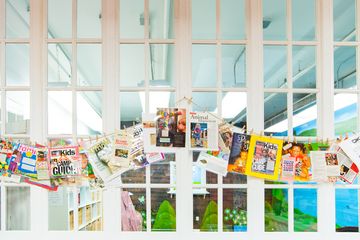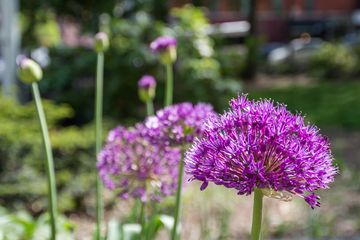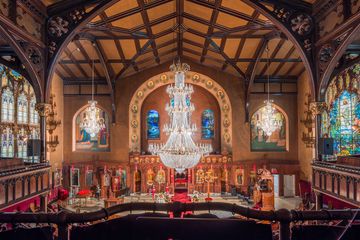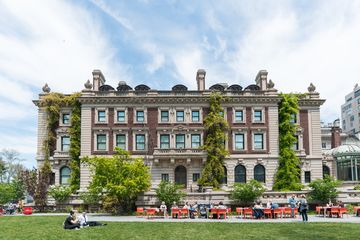I never miss the opportunity to gaze upward when entering a space in the hopes of discovering a chandelier (Check out our Sideways Story on the stunning chandeliers of the Side Streets). Peeking inside Annunciation Greek Orthodox Church on a Sunday afternoon, it was the dazzling, yet unlit, fixture that captured my attention first. I could still decipher its glistening in the dim shafts of light filtering through the stunning figurative stained glass "Transfiguration of Christ" by L. C. Tiffany (containing over 17, 561 individual pieces of glass). When I returned to the church with members of our team and Chrissi Nicolas, the office manager, turned on a few of the lights, we were able to see the spectral beams produced by the Czechoslovakian crystal. The entire sanctuary appeared to work in tandem, with the stained glass projecting light on the chandelier, which in turn reflected it onto the artwork surrounding the altar. For those who attend and work at Annunciation, it is considered a miraculous place. Chrissi told us that it was built in 1894 as the Fourth Presbyterian Church. The Greek Orthodox Church bought the location in 1953, after having met in various locations since its founding as the “Evangelismos” (“The Good News”) church in the late nineteenth century. At the beginning, the entire space was lit with a combination of electricity and gas lighting. They used an ingenious series of vents that allowed the gas to escape while turning on every light in the room with a single flint switch. “For its time, this building had amazing engineering, ” Chrissi said. We ascended to the loft, where we received a view of the magnificent pipe organ. Annunciation's organ is one of the few tonally unaltered organs designed by E. M. Skinner that remain in existence today. We learned a lot about the traditions and practices of the Greek Orthodox Church through Chrissi. For example, one always knows the feast day is celebrated by the church by looking to the left of the Royal Doors of the altar to see what icon appears there. Chrissi also provided us with an interpretation of the surrounding religious art imagery. For example, in the painting of the Annunciation, the angel has his feet apart to show that he is running towards the Virgin Mary. In 1957, the congregation installed an intricate iconastasis screen of linden and lime tree wood designed and executed in Greece by noted Byzantine-style woodcarver Theophanis Nomikos, with inset icons hand-painted by New York iconographer Konstantinos Youssis of the Bronx. There are many coincidences contained within the church’s history. For example, the Greek Orthodox congregation that would become Annunciation was founded in 1892, the same year the church at 91st Street was starting to be built. Also, the congregation moved into the building on March 25th, the day of the Annunciation of Christ, hence the name. Possibly the most mysterious fact about the church, however, is that one of the priests is said to have been visited by St. Xenia, a little-known saint. After his vision, the priest was hesitant to tell anyone, since it was the twentieth century, and he was afraid that no one would believe him. But he did some research, and discovered that St. Xenia did, in fact, exist. In his vision, she asked him to paint her icon. He did, and today the icon he painted holds a special position in the sanctuary and in the history of the parish



